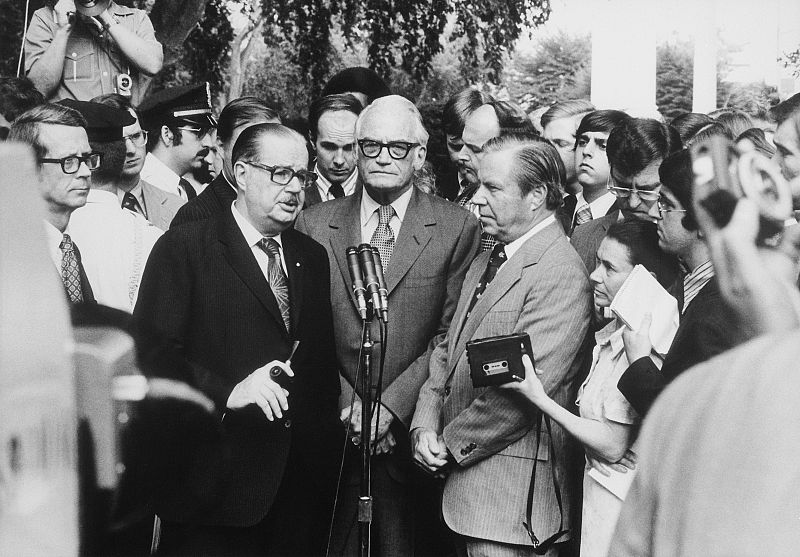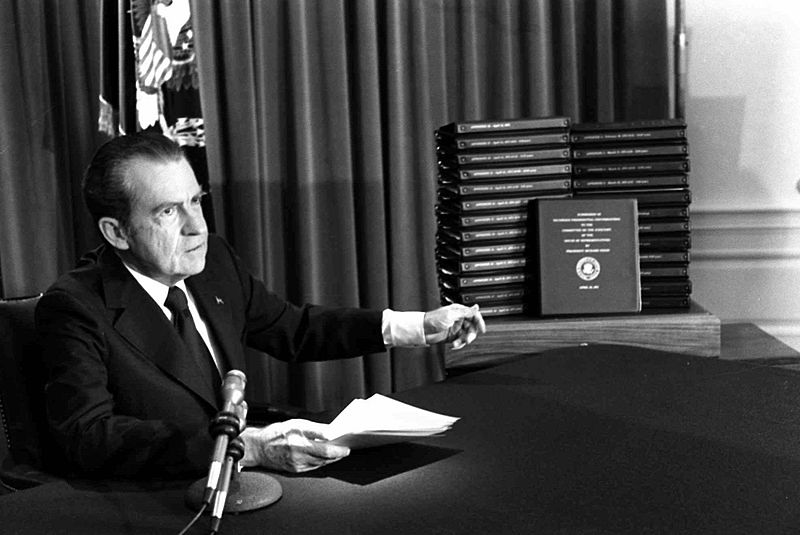
The GOP wall: Why Republicans won't walk away from Trump
by Alex Seitz-WaldWASHINGTON — Late in the afternoon of Aug. 7, 1974, Republican leaders in Congress traveled up Pennsylvania Avenue to the White House to deliver a stark message to Richard Nixon: His presidency was over.
The public had turned on Nixon as evidence emerged about his role in the Watergate scandal and the bottom fell out once his own party abandoned him.
"None of us doubted the outcome. He would resign," conservative Sen. Barry Goldwater later wrote of the meeting in his memoir. Two days later, Nixon stepped down.
Today, as Democrats in the House of Representatives move toward bringing articles of impeachment against President Donald Trump, with the next Judiciary Committee hearing of evidence set for Monday, few Democrats are still clinging to the hope that Republicans will reach a breaking point with Trump like they did with Nixon.
"I really don't think there is any fact that would change their minds," Rep. Jim Himes, D-Conn., a member of the House Intelligence Committee, told NBC News.
Why? Two key changes since Nixon: a massive divide in American political life — we hate the other team more than ever before — and a media climate that fuels and reinforces that chasm, powered by Fox News on the Republican side.
Himes said he was "a little stunned by the unanimity on the Republican side," especially among retiring lawmakers who don't have to worry about surviving a GOP primary had they gone against Trump. "We're in a place right now where all that matters to my Republican colleagues is the defense of the president," he added.
No Republican congressmen have said they support impeachment. In the Senate, the entire GOP voted to condemn the impeachment inquiry, except for three moderates: Mitt Romney of Utah, Susan Collins of Maine, and Lisa Murkowski of Alaska. The three have stopped short of saying they support Trump's impeachment, however, and it would take at least 20 Republican senators to vote to convict him in a Senate trial for removal to succeed.
Meanwhile, pollsshow Americans' views on Trump and impeachment have barely budged, even though millions tuned in to watch the televised hearings before the House Intelligence and Judiciary committees over the last few weeks.
The sliver of the electorate that remains undecided seems to be mainly those paying the least attention to politics, so it's unclear whether new information would really even sway them.
"The numbers still don't look good for Trump, but they definitely haven't gotten worse," pollster Tim Malloy of Quinnipiac University said.
Then and now
That's not how it happened 45 years ago, when televised Watergate hearings helped turn the tide of public opinion against a president who had just been re-elected in a landslide. The public pressure helped push a number of Republicans to abandon Nixon and join a bipartisan impeachment drive.
William Cohen, a former GOP House member, senator and Secretary of Defense from Maine, doesn't think that will happen today.
He was one of seven Republicans out of 17 on the House Judiciary Committee who voted to advance articles of impeachment against Nixon and was one of the most vocal critics of Watergate at the time.
"We're living in a really different era," he said. "The partisanship is deeper. It's a cynical, suspicious society. The conspiracy theories that were once fringe elements have been allowed to filter into the mainstream."

Until relatively recently, the political parties were jumbled coalitions of regional, ideological and racial groups that included conservative Democrats in the South and liberal Republicans from the Northeast.
The first Republican senator to call for Nixon's resignation, for instance, was an African American from Massachusetts, Edward Brooke.
And Nixon found staunch support among some Democrats, too, many of whom represented working-class areas that had been part of the "silent majority" that helped the president win 49 out of 50 states in his 1972 re-election. As late as July of 1974, just days before Republicans leaders went to the White House to tell Nixon to quit, The Washington Post estimated there were still about 25 House Democrats in the "never" camp on impeachment.
Both support for and opposition to impeachment were bipartisan.
Since then, the Democratic and Republican parties have slowly congealed into monoliths of like-minded Americans who not only vote the same way, but also tend to live in the same kinds of neighborhoods, listen to the same kinds of music, worship (or not) the same way — even wear the same kinds of jeans.
Norm Ornstein, a scholar at the conservative American Enterprise Institute, said it's not just polarization, but "tribalism."
"That means anyone who is not part of your tribe is the enemy," Ornstein said. "And anything you do to take on your own tribe becomes heresy. And I think that's different from what we had before."
Political scientists call it "negative partisanship" because Americans are now often driven more by wanting to punish the other side than wanting to advance their own cause.
Republicans know well by now that anyone who steps out of line in Trump's GOP faces near certain excommunication and humiliation, with a long trail of upended careers as proof in the likes of Jeff Flake, Bob Corker and Mark Sanford. No one is safe, not even Sen. John McCain, a war hero.
"I've never seen anything like it," Cohen said. "The Republican Party today is not loyal to principles as such, but loyal to the person of Donald Trump. He is really a cult figure. Nixon was not a cult figure. With Nixon, you didn't feel the personal loyalty to the man, but to the party."
The media divide
As the political landscape cleaved in the past 40 years, so did the way voters get information about politics and the trust they put in it.
Americans had little choice but to learn about Watergate through the mainstream media. There were only three major TV networks, so they couldn't switch away to a cable or streaming show when their program got interrupted by special reports on the Watergate hearings.
The result was more than 70 percent of the country tuned in to at least part of the Watergate hearings. And they generally believed the news.
The vast majority of Americans — 69 percent — said in 1974 that they trusted the media to report the news "fully, accurately and fairly," according to Gallup. That number has plummeted to just 41 percent today.
The collapse is driven largely by Republicans. Today, just 15 percent of Republicans say they generally trust the mainstream media, compared with 69 percent of Democrats.
There's only one news outlet that a majority of Republicans told Gallup they trust today: Fox News.

Of course, key voices on Fox and other conservative media outlets have consistently defended Trump, attacked Democrats, sown doubt about the mainstream press, and advanced alternative theories, often lacking basis and of a conspiratorial nature, to explain away any damaging facts about Trump that have emerged from the inquiry.
John Dean, the former Nixon White House lawyer who helped turn the tide on Watergate by testifying against the president, has famously said that Nixon "might have survived if there'd been a Fox News."
"Polarization cannot be a justification for Republican facts, morality and rule of law or a Democratic facts, morality and rule of law," Dean added in an email to NBC News. "If polarization justifies multiple realities, democracy as we know it has ended."
But Nixon biographer John Farrell noted the mainstream press had a more positive view of Nixon that the famed story of Bob Woodward and Carl Bernstein's hard-nosed reporting often obscures.
"Nixon's support in the 1972 election was widespread in the press," Farrell said. "He was probably endorsed by 90 percent of the nation's newspaper editorial boards. It took a very long time for the press to come around and it took an even longer time for the public to follow."
Today, conservative media has doubled down on support for Trump, reassuring its audience there's nothing to be concerned about, either in Trump's actions with Ukraine or Democrats' decision to draft articles of impeachment against him.
"The Democrats have just hoisted themselves on their own petard, guaranteeing Donald Trump re-election in 2020," Fox host Jeanine Pirro said in a clip Trump tweeted to her millions of followers.